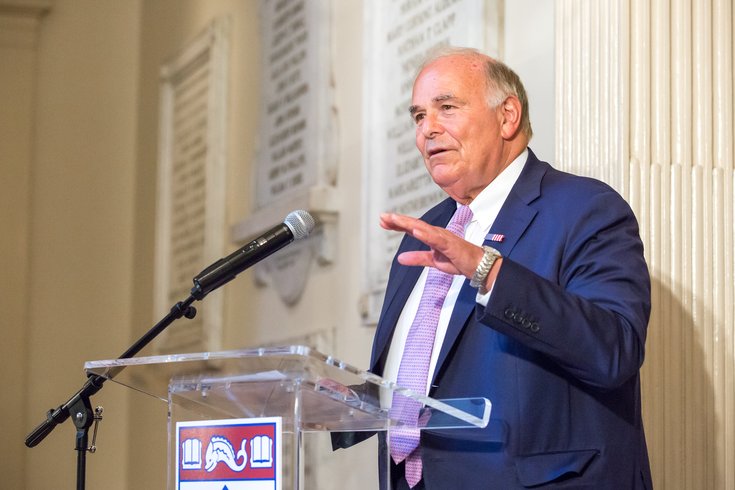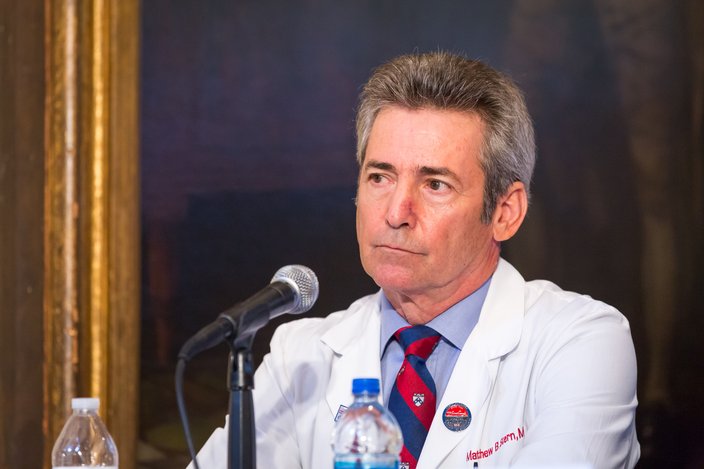
June 18, 2018
 Thom Carroll/PhillyVoice
Thom Carroll/PhillyVoice
Former Pennsylvania Gov. Ed Rendell announced Monday he has Parkinson's Disease during a press conference at Pennsylvania Hospital.
Former Pennsylvania Gov. Ed Rendell made his three-year battle with Parkinson's disease public on Monday, saying a combination of medicine and physical therapy have stabilized the neurodegenerative disorder.
Rendell, 74, decided to make his condition public in an effort to encourage others experiencing symptoms similar to those he began having more than three years ago – slowness of movement, balance struggles and a tremor – to seek treatment.
"When it happened, I was stunned," Rendell said. "Stunned, because like many of us, I had always viewed myself as indestructible. ... I never missed a day of work. All of a sudden, I had a disease."
There is no known cure for Parkinson's disease, a progressive neurodegenerative disorder that mostly impacts movement.
But Rendell said it does not have to be a death sentence, noting that many of his symptoms have improved since he began a treatment that includes several medications and physical therapy six times each week.
The former Philadelphia mayor still maintains a busy workload and eats many of the same foods as he did being diagnosed with Parkinson's 3.5 years ago.
"I want to send a message to the people from our area who may have some of the same symptoms, but may be too afraid to go in and get diagnosed," Rendell said. "Sometimes you think, 'If I don't go to the doctor and nobody identifies what I have, then I'm healthy.' Well, that's not true.
"The key to this is to get to it early."
Former Pennsylvania Gov. Ed Rendell spoke at a press conference at Pennsylvania Hospital, Monday, where he announced he was diagnosed with Parkinson's Disease over 3 years ago.
Ed Rendell urged other people experiencing symptoms similar to those he experienced to seek treatment. His treatment team, including Dr. Matthew B. Stern, joined him.
Stern, director emeritus of Penn Medicine's Parkinson's Disease and Movement Disorders Center, stressed that patients with Parkinson's disease can live full and active lives.
He pointed to Rendell as a prime example.
Rendell spent nearly half of May on the road, traveling to New York, Baltimore, Detroit, San Francisco and Washington. His busy schedule pushed his annoucnement back to mid-June.
"By telling his story, I hope he will inspire others who have this condition to come forward and not be afraid to be diagnosed, and to continue living a rich, healthy and near-normal life," Stern said.
Still, Rendell admitted he was scared when he first got the diagnosis. He had watched his late mother, Emma, battle Parkinson's for the final 13 years of her life.
"The good news is that I've always been a fighter," Rendell said. "I was stunned. I was a little scared. But Dr. Stern said there was a path. I said, 'We're going to take this path.'"
Parkinson's disease causes nerve cells within the brain to deteriorate, leading to a deficiency in the neurochemical dopamine.
For many patients, Stern said he prescribes medication that replentishes dopamine and supplemental drugs that mitigate symptoms. He also encourages physical therapy and exercise.
It has worked for Rendell, who proudly touted his ability to stack four ice trays with water and place them in his freezer without spilling any water.
Penn Medicine neurologist Dr. Matthew Stern is treating former Gov. Ed Rendell for Parkinson's disease.
Rendell receives physical therapy from Heather Cianci at Good Shepherd Penn Partners, a joint venture between the Good Shepherd Rehabilitation Network in Allentown and the University of Pennsylvania Health System.
"She makes you do mental excercises as you do physical exercises," said Rendell, who also receives assistance from his personal trainer, Hanna Purbe, of The Sporting Club at the Bellevue. "You think you know that stuff, but when you're in the midst of doing that stuff, it becomes pretty hard."
Though Rendell pleaded on Monday for others to consider treatment, he needed some prodding himself.
"When you hear Parkinson's disease, it's almost like hearing Alzheimer's," Rendell said. "But it doesn't have to be a change to your quality of life. You've got to get in early and get treatment early."
Rendell said he sought treatment at the urging of his son, Jesse; wife, Midge; and longtime colleague David L. Cohen.
Though it took Rendell three years to announce his condition publicly, his son does not see Parkinson's disease slowing his father down.
"He's going to work until the day that he passes away," Jesse Rendell said. "That's just the way he is."